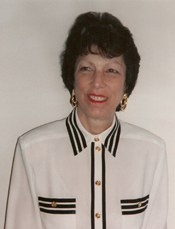 Nancy Lelewer Sonnabend ’57 is an author, researcher, inventor, and lecturer who has been engaged in early childhood development and learning disabilities for over forty-five years. Her books include The Lelewer Legacy: Traditions of a Loving Family. In 2004, she received the Alice H. Garside award from the Massachusetts Branch of the International Dyslexia Association for her outstanding contribution to the field of Learning Disabilities. Nancy is an Executive Advisor to the Asperger's Association of New England and a member of the National Board of the Hearing Loss Association of America.
Nancy Lelewer Sonnabend ’57 is an author, researcher, inventor, and lecturer who has been engaged in early childhood development and learning disabilities for over forty-five years. Her books include The Lelewer Legacy: Traditions of a Loving Family. In 2004, she received the Alice H. Garside award from the Massachusetts Branch of the International Dyslexia Association for her outstanding contribution to the field of Learning Disabilities. Nancy is an Executive Advisor to the Asperger's Association of New England and a member of the National Board of the Hearing Loss Association of America.
What brought you to Sarah Lawrence?
I was frustrated in high school because every time I became interested in a subject, I couldn’t pursue it as I would have to study for a test for another class. As I’m dyslexic, I read slowly and it seemed to me for the most part what I was doing in high school was reading and taking tests about what I had read or on the teacher’s lecture. Sarah Lawrence, with no tests, small interactive classes, and individual conferences where one could choose what one wanted to study, sounded and was great.
What was your favorite spot on campus?
I spent a lot of time studying in the library and in my room. Occasionally I would read under a tree. I enjoyed playing on the tennis team. Barbara Katz Judd ’57 and I won the New England Regional’s doubles our sophomore year.
Which faculty members had the most influence on your time at Sarah Lawrence?
Having sat up all night on the train from Chicago to NY, I arrived at Penn Station, transferred to Grand Central, got the train to Bronxville, deposited my luggage and myself into a taxi and arrived at Sarah Lawrence College. The taxi let me off at the administration office, next to the tennis courts. I checked in and promptly learned I would be in off-campus housing a block away. As I began to lug my suitcase and footlocker down the path to the street, I thought I heard someone call out, “Nancy.” I paid no attention. There were surely other girls named Nancy at Sarah Lawrence. “Nancy Lelewer,” the voice now said. I whirled around and saw a handsome man, probably in his thirties, wearing tennis whites and holding a tennis racket.
“Hi,” he said. “I’m Harold Taylor. You are a tennis player, right?”
“Yes,” I said with some bewilderment.
“Do you have your racket and tennis clothes in that baggage?”
“Yes.”
“Well hurry up. We need a fourth and we’ll wait for you.”
That was my start at Sarah Lawrence and the beginning of my relationship with Harold Taylor. In time, I would read every press release before he released them to the national press.
I was also close to my don, Adda Bozeman, who taught me much intellectually and was a great emotional support. Justa Lopez-Rey researched all the Spanish abroad programs and encouraged me to transfer to Smith College and spend my junior year with Smith in Madrid, which I did. At the end of the year I transferred back to Sarah Lawrence for my senior year and heard Eleanor Roosevelt speak at our graduation. I have a copy of her speech.
You have written several books and contributed to others. The most recent is Aging Wisely…Wisdom of Our Elders by Silverman and Siegel. How did that book come about?
Seven years ago, I received a phone call from a man who identified himself as Irving Silverman. He told me he had recently moved to New Bridge on the Charles (a senior retirement village) that he had a profound hearing problem, was 90 years old, and was trying to get induction loops (often called hearing loops) installed at New Bridge. My name kept surfacing as the go-to person, even though I live in downtown Boston, 45 minutes away. We had dinner together and I could tell immediately that Irving was a special human being and very persistent. It took Irving five years ,but he finally got the three common rooms at New Bridge looped. Then at 95, he started on the book project. I didn’t like his title or the fact that he was only interviewing people at New Bridge—it was too narrow for any publisher to sell. Irving persisted and found a publisher who told him what I told him. Gave the book a new title (the one it now has) and he needed to find people from all over the country and of different ethnic groups. That’s where I came back in. Irving wrote me to please help him by writing a couple of chapters and finding people all over the country and from different ethnic backgrounds—which is what I did. The book came out in June and is doing well. I’m helping to promote it.
You recently celebrated your 60th Reunion. What did you enjoy most about returning to campus for Reunion?
Seeing classmates and the two lunches I attended. I would like to see the president’s house renamed the Taylor House, Home to the President. Without Harold Taylor, Sarah Lawrence would not be the school it is today. Harold Taylor made Sarah Lawrence.